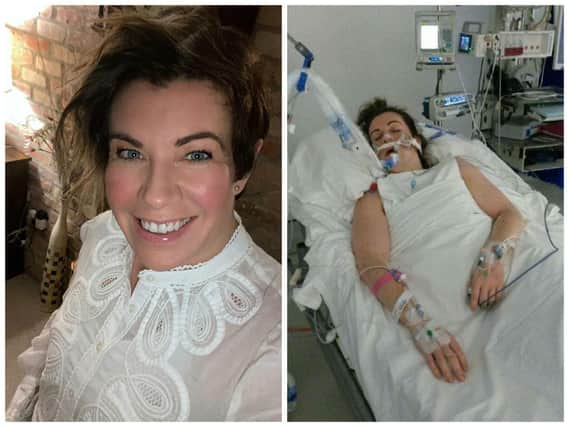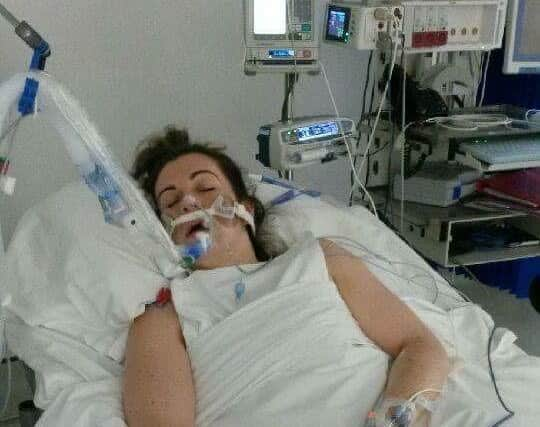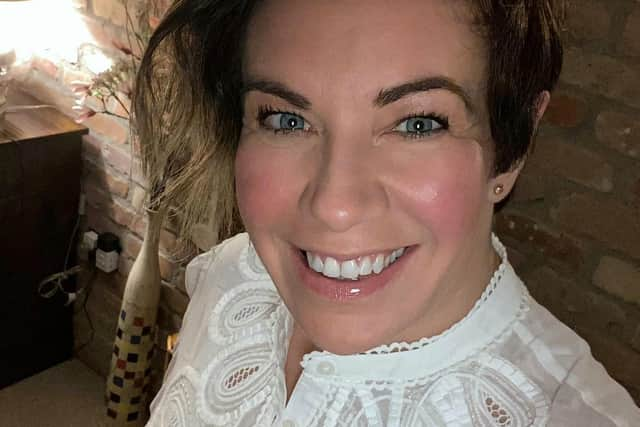Clodagh speaks in Derry about the experience of being locked in her own body after stroke


Clodagh was only 35 when she had a stroke and she says there were signs there that something wasn’t right before the event.
“I presented a couple of times at hospital saying that I wasn't well” Clodagh said. “I believed there was something wrong, but I was sent home and it was diagnosed as an unexplained loss of consciousness or maybe just tiredness from working. I had the first incident on April 2, which was misdiagnosed, and then on April 6, I had a brain stem stroke.
Advertisement
Hide AdAdvertisement
Hide Ad"The stroke was caused by a clot, which was discharged from an artery in my neck into the brain stem and got lodged in it. I had a procedure in the Royal Victoria Hospital, a mechanical thrombectomy that removed the clot and saved my life. I was on life support for 10 days, then moved to the stroke ward in the Royal for six weeks and then I was in rehabilitation for six and a half months at Musgrave Park Hospital.”


Clodagh suffered from locked-in syndrome, a rare neurological side effect of a brain stem stroke, where the patient is cognitively fine but their body is completely paralysed.
"I could think, I could hear everything going on and I could see,” Clodagh continued. “I had my feelings and emotions as normal and I could feel pain and itches, but I had no way of letting anybody know that I was there.
“I would say it's probably one of the most terrifying things I've ever experienced, to not be able to communicate what you're thinking or feeling. But in many ways, I think I'm grateful I experienced it because it's made me a lot more humble and understanding of people who have communication difficulties. My mother would say I have the patience of a saint, but when you experience locked-in syndrome and not being able to talk or communicate, you realise just how important being able to talk is.”
Advertisement
Hide AdAdvertisement
Hide AdClodagh is an ambassador for NI Chest, Heart and Stroke and she also does work with the Stroke Association. She was recently asked to speak Stroke Association NI’s first Peer Support Event as part of its STEPS Support scheme, which offers emotional support and counselling for stroke survivors, carers and relatives impacted by stroke.


She said: “I enjoy sharing my experience with people because in many ways it was other stroke survivors sharing their recovery with me that made me believe that I would recover. I enjoy giving back and hope that by sharing my story and my struggles of recovery, it will help other people who are in a similar position. In many ways, I can't ever say ‘thank you’ to my local community for how well they supported me during my stroke so this is my way of saying thanks when I'm invited to speak.
"NI Chest, Heart and Stroke and the Stroke Association did so much for me since my stroke and what they do for stroke survivors; having their support groups, having their prep class, it’s vitally important in your stroke recovery. It's huge being discharged from hospital and knowing that you're suddenly going to have to try and recover from stroke yourself. Statutory services stop very abruptly in the NHS once you're discharged and that's very daunting. The likes of the Stroke Association and NI Chest, Heart and Stroke offer their programmes post discharge from hospital. You're left in a sort of abyss where you're suddenly dealing with a life changing injury and you don't know how to move forward with your life or how to rebuild it. But you go to these classes and you're meeting other people who have got the same questions and the same challenges and suddenly you feel not alone. When you're discussing things with family and friends and they tell you you're going to be okay and you're left asking them ‘but how do you know?’ When you talk to people who've experienced similar things to you and they're telling you you will do it or you're going to do it. It really empowers you to believe in yourself and making you believe that you will recover or that you can rebuild your life. They've been vitally important to me.”
Clodagh has come a long way since having a stroke and locked-in syndrome and relearning how to swallow, breath, walk and talk again but she says recovery is ‘still a process’.
Advertisement
Hide AdAdvertisement
Hide Ad“I think when you have a stroke it's always going to be a part of your life but certainly it doesn't rule my life. It's part of my identity now and who I am but it's not a negative part. It doesn't prevent me from living quite a normal life, if there is such a thing as normal. I work full time, I enjoy gardening, I have a great social network of friends and life feels very much normal. I think people with disabilities should be encouraged or should be supported if they want to return to work. I think return to work has been a very huge part in me overcoming any mental health struggles. I do have disabilities now as a result of stroke but I feel that my employer is supportive and indeed I'm still back at work as a police officer. I feel the community is supportive and I think anyone with a disability should be supported if they want to work.”